2020年10月4日
Zephyr OSで遊ぼう その17 - SMP対応の準備、コンテキストスイッチの実装、後編2、明示的コンテキストスイッチ
目次: Zephyr
前回はRISC-Vの明示的なコンテキストスイッチの既存実装を調べました。今回は新しいコンテキストスイッチを実装します。
対応方針
従来と新形式のコンテキストスイッチで大きく異なるのは、下記の要素です。
| 明示的コンテキストスイッチ | 従来 | 新形式 |
|---|---|---|
| 割り込まれた処理の返り値 | 設定必要(thread->arch.swap_return_value) | 設定不要(do_swap() がやってくれる) |
| 切り替え元スレッド | _kernel.cpu[0].current | a1レジスタ(引数old_thread->switch_handle) |
| 切り替え先スレッド | _kernel.ready_q.cache | a0レジスタ(引数new_thread->switch_handle) |
| プリエンプション | 従来 | 新形式 |
|---|---|---|
| 割り込まれた処理の返り値 | 設定必要(thread->arch.swap_return_value) | 設定不要(do_swap() がやってくれる) |
| 切り替え元スレッド | _kernel.cpu[0].current | _kernel.cpu[n].current(※) |
| 切り替え先スレッド | _kernel.ready_q.cache | z_get_next_switch_handle() の返り値 |
(※)初めは切り替え元スレッドですが、z_get_next_switch_handle() を呼ぶと、切り替え先のスレッドに変わります。
割り込まれた処理の返り値
割り込まれた処理の返り値を -EINTRに設定するために必要な処理は、do_swap() がやるため実装は必要ありません。従来の処理が間違って発動しないように #ifdefで消しておきます。
swap_return_valueは不要
// zephyr/arch/riscv/core/isr.Sの差分
+ /* Save stack pointer of current thread. */
+ RV_OP_STOREREG sp, _thread_offset_to_sp(t1) //★スタックポインタ保存は新しい形式でも必要★
+
+#ifndef CONFIG_USE_SWITCH
/*
- * Save stack pointer of current thread and set the default return value
- * of z_swap to _k_neg_eagain for the thread.
+ * Set the default return value of z_swap to _k_neg_eagain for
+ * the thread.
*/
- RV_OP_STOREREG sp, _thread_offset_to_sp(t1)
la t2, _k_neg_eagain
lw t3, 0x00(t2)
sw t3, _thread_offset_to_swap_return_value(t1) //★返り値設定は不要★
+#endif /* !CONFIG_USE_SWITCH */
// zephyr/arch/riscv/core/offsets/offsets.c
//★_thread_offset_to_swap_return_value() マクロを使えるようにする仕掛け★
#ifndef CONFIG_USE_SWITCH
GEN_OFFSET_SYM(_thread_arch_t, swap_return_value); //★いらない★
#endif /* !CONFIG_USE_SWITCH */
// zephyr/include/arch/riscv/thread.h
struct _thread_arch {
#ifndef CONFIG_USE_SWITCH
uint32_t swap_return_value; /* Return value of z_swap() */ //★いらない★
#endif /* !CONFIG_USE_SWITCH */
};
処理を消すだけでも動きますが、swap_return_valueを間違って使うとバグの元なので、変数宣言ごと消します。
切り替え元/切り替え先スレッド
従来は常に _kernel変数を見れば良かったので楽でした。新形式では明示的コンテキストスイッチとプリエンプションで切り替え元/切り替え先スレッドの取得方法が異なります。よって、明示的コンテキストスイッチとプリエンプションで、スレッドの扱いを揃える必要があります。
設計する人の自由で決めて構いませんが、今回は合流地点(reschedule)に辿り着く前に切り替え元(old_thread)、切り替え先スレッド(new_thread)を取得し _currentにnew_threadを設定し, t1レジスタにold_threadを設定することとします。
明示的コンテキストスイッチの場合、切り替え元と切り替え先スレッドは引数で渡されます。引数はハンドラの先頭でスタックに保存されますので、スタックからロードできます。
切り替え元/切り替え先スレッドの取得
// zephyr/arc/riscv/core/isr.S
#ifdef CONFIG_USE_SWITCH
/*
* Get new_thread and old_thread from stack.
* - a0 = new_thread->switch_handle -> _current
* - a1 = &old_thread->switch_handle -> t1
*/
/* Get reference to _kernel */
la t2, _kernel
/* Get new_thread from stack */
RV_OP_LOADREG t1, __z_arch_esf_t_a0_OFFSET(sp) //★スタックから切り替え先スレッド取得★
/* Set new thread to _current */
RV_OP_STOREREG t1, ___cpu_t_current_OFFSET(t2) //★(2) この関数内でnew_threadを _currentに設定★
/* Get old_thread from stack and set it to t1 */
RV_OP_LOADREG t1, __z_arch_esf_t_a1_OFFSET(sp) //★(1)スタックから切り替え元スレッド取得、t1レジスタにold_threadを設定★
addi t1, t1, -___thread_t_switch_handle_OFFSET //★(A) old_thread->switch_handleの更新★
#endif
/*
* Go to reschedule to handle context-switch
*/
j reschedule
// zephyr/arch/riscv/core/thread.c
void arch_new_thread(struct k_thread *thread, k_thread_stack_t *stack,
char *stack_ptr, k_thread_entry_t entry,
void *p1, void *p2, void *p3)
{
struct __esf *stack_init;
...
#ifdef CONFIG_USE_SWITCH
thread->switch_handle = thread; //★(B) switch_handleの初期値設定★
#endif
}
処理 (1) でnew_threadを _currentに設定していて、処理 (2) でold_threadをt1レジスタに設定してから、rescheduleにジャンプします。
wait_for_switch() への対処
スレッドと直接関係ないもののold_thread->switch_handleを更新する処理も重要です。あとでハマりやすいポイントですので、補足しておきます。
以前、少し言及しましたが(2020年9月30日の日記参照)、switch_handleの更新を実装し忘れるとCONFIG_SMPを有効にしたときにwait_for_switch() で無限ループに陥ってハマります。
Zephyrのドキュメントにてarch_switch() を見ると(Zephyr Project: arch_switch)、スレッドにレジスタを退避後、old_thread->switch_handleをNULL以外の値で書き換える必要があります。これはコンテキストスイッチ処理内で行う (A) の処理に相当します。
実はこれだけではダメです。wait_for_switch() はコンテキストスイッチの「前」に呼ばれるからです。一番最初に発生するコンテキストスイッチのold_thread->switch_handleは誰も書き換えてくれないのでハングします。この問題の対処としてスレッド生成時にswitch_handleを初期化する (B) の処理を実装しています。
次回はプリエンプションの実装をします。
コメント一覧
- コメントはありません。
 この記事にコメントする
この記事にコメントする
2020年10月3日
Zephyr OSで遊ぼう その16 - SMP対応の準備、コンテキストスイッチの実装、後編1、RISC-Vのコンテキストスイッチ
目次: Zephyr
前回は、AArch64の実装を調べました。いよいよ新しい方式のコンテキストスイッチを実装したいところですが、その前にもう一つだけRISC-Vの既存実装を調べます。
RISC-Vの2つのコンテキストスイッチ経路
RISC-V向け実装において、コンテキストスイッチが行われる条件は2つあります。1つはスリープしたときなどに呼ばれる明示的なコンテキストスイッチです。do_swap() を経由します。もう1つは割り込み発生時に行われるプリエンプションです。
- 明示的コンテキストスイッチ
- do_swap() -> arch_switch() ラッパー関数 -> z_riscv_switch() -> ecall -> __irq_wrapper -> is_syscall -> reschedule -> no_reschedule -> mret
- プリエンプション
- (任意の場所) -> __irq_wrapper -> is_interrupt -> on_irq_stack -> 割り込みハンドラ(isr_timer() など) -> on_thread_stack -> reschedule -> no_reschedule -> mret
明示的コンテキストスイッチについては、以前(2020年9月29日の日記参照)実装したラッパー関数がスタート地点となります。コードを変更する前に、従来のコンテキストスイッチがどんな経路を通るか確認します。
arch_switch() ラッパー関数 -> z_riscv_switch() -> ecall -> __irq_wrapper -> is_syscall
// zephyr/arch/riscv/include/kernel_arch_func.h
static inline void arch_switch(void *switch_to, void **switched_from)
{
z_riscv_switch(switch_to, switched_from);
}
// zephyr/arch/riscv/core/swap.S
/*
* void z_riscv_switch(void *switch_to, void **switched_from)
*/
SECTION_FUNC(exception.other, z_riscv_switch)
/* Make a system call to perform context switch */
ecall //★例外を発生させる★
jalr x0, ra
// zephyr/arch/riscv/core/isr.S
/*
* Handler called upon each exception/interrupt/fault
* In this architecture, system call (ECALL) is used to perform context
* switching or IRQ offloading (when enabled).
*/
SECTION_FUNC(exception.entry, __irq_wrapper)
/* Allocate space on thread stack to save registers */
addi sp, sp, -__z_arch_esf_t_SIZEOF
...
/*
* Check if exception is the result of an interrupt or not.
* (SOC dependent). Following the RISC-V architecture spec, the MSB
* of the mcause register is used to indicate whether an exception
* is the result of an interrupt or an exception/fault. But for some
* SOCs (like pulpino or riscv-qemu), the MSB is never set to indicate
* interrupt. Hence, check for interrupt/exception via the __soc_is_irq
* function (that needs to be implemented by each SOC). The result is
* returned via register a0 (1: interrupt, 0 exception)
*/
jal ra, __soc_is_irq
/* If a0 != 0, jump to is_interrupt */
addi t1, x0, 0
bnez a0, is_interrupt //★割り込みの場合はこちらにジャンプする★
/*
* If the exception is the result of an ECALL, check whether to
* perform a context-switch or an IRQ offload. Otherwise call _Fault
* to report the exception.
*/
csrr t0, mcause
li t2, SOC_MCAUSE_EXP_MASK
and t0, t0, t2
li t1, SOC_MCAUSE_ECALL_EXP
/*
* If mcause == SOC_MCAUSE_ECALL_EXP, handle system call,
* otherwise handle fault
*/
beq t0, t1, is_syscall //★ecallの場合はこちらにジャンプする★
/*
* Call _Fault to handle exception.
* Stack pointer is pointing to a z_arch_esf_t structure, pass it
* to _Fault (via register a0).
* If _Fault shall return, set return address to no_reschedule
* to restore stack.
*/
addi a0, sp, 0
la ra, no_reschedule
tail _Fault //★いずれでもなければ停止させる★
...
Zephyr RISC-V向け実装では、割り込み・例外ハンドラは1つだけです。割り込みも例外も全て __irq_wrapperに飛んできますから、最初の方で要因をチェックして仕分けしています。RISC-Vの規格としては割り込み要因ごとに別の割り込みハンドラに飛べる形式(ベクタ形式)もありますが、Zephyrは使っていません。
明示的コンテキストスイッチの実行経路: is_syscall -> reschedule -> no_reschedule -> mret
// zephyr/arch/riscv/core/isr.S
is_syscall:
/*
* A syscall is the result of an ecall instruction, in which case the
* MEPC will contain the address of the ecall instruction.
* Increment saved MEPC by 4 to prevent triggering the same ecall
* again upon exiting the ISR.
*
* It's safe to always increment by 4, even with compressed
* instructions, because the ecall instruction is always 4 bytes.
*/
RV_OP_LOADREG t0, __z_arch_esf_t_mepc_OFFSET(sp)
addi t0, t0, 4
RV_OP_STOREREG t0, __z_arch_esf_t_mepc_OFFSET(sp)
...
/*
* Go to reschedule to handle context-switch
*/
j reschedule //★コンテキストスイッチ★
...
reschedule:
...
/* Get reference to _kernel */
la t0, _kernel
/* Get pointer to _kernel.current */
RV_OP_LOADREG t1, _kernel_offset_to_current(t0)
/*
* Save callee-saved registers of current thread
* prior to handle context-switching
*/
RV_OP_STOREREG s0, _thread_offset_to_s0(t1)
RV_OP_STOREREG s1, _thread_offset_to_s1(t1)
...
RV_OP_STOREREG s10, _thread_offset_to_s10(t1)
RV_OP_STOREREG s11, _thread_offset_to_s11(t1)
...
/*
* Save stack pointer of current thread and set the default return value
* of z_swap to _k_neg_eagain for the thread.
*/
RV_OP_STOREREG sp, _thread_offset_to_sp(t1)
la t2, _k_neg_eagain
lw t3, 0x00(t2)
sw t3, _thread_offset_to_swap_return_value(t1)
/* Get next thread to schedule. */
RV_OP_LOADREG t1, _kernel_offset_to_ready_q_cache(t0)
/*
* Set _kernel.current to new thread loaded in t1
*/
RV_OP_STOREREG t1, _kernel_offset_to_current(t0)
/* Switch to new thread stack */
RV_OP_LOADREG sp, _thread_offset_to_sp(t1)
/* Restore callee-saved registers of new thread */
RV_OP_LOADREG s0, _thread_offset_to_s0(t1)
RV_OP_LOADREG s1, _thread_offset_to_s1(t1)
...
RV_OP_LOADREG s10, _thread_offset_to_s10(t1)
RV_OP_LOADREG s11, _thread_offset_to_s11(t1)
...
no_reschedule:
...
/* Restore MEPC register */
RV_OP_LOADREG t0, __z_arch_esf_t_mepc_OFFSET(sp)
csrw mepc, t0
/* Restore SOC-specific MSTATUS register */
RV_OP_LOADREG t0, __z_arch_esf_t_mstatus_OFFSET(sp)
csrw mstatus, t0
...
/* Restore caller-saved registers from thread stack */
RV_OP_LOADREG ra, __z_arch_esf_t_ra_OFFSET(sp)
RV_OP_LOADREG gp, __z_arch_esf_t_gp_OFFSET(sp)
RV_OP_LOADREG tp, __z_arch_esf_t_tp_OFFSET(sp)
RV_OP_LOADREG t0, __z_arch_esf_t_t0_OFFSET(sp)
...
RV_OP_LOADREG a6, __z_arch_esf_t_a6_OFFSET(sp)
RV_OP_LOADREG a7, __z_arch_esf_t_a7_OFFSET(sp)
/* Release stack space */
addi sp, sp, __z_arch_esf_t_SIZEOF
/* Call SOC_ERET to exit ISR */
SOC_ERET
コメントが丁寧に書いてあって素晴らしいですね。コンテキストスイッチの手順はAArch64の実装とほぼ同じですが、AAarch64は明示的なコンテキストスイッチとプリエンプションが独立して実装されており、RISC-Vはrescheduleで両者が合流する点が違います。コンテキストスイッチの説明は先日(2020年10月1日の日記参照)の紙芝居が参考になるかと思います。
明示的なコンテキストスイッチとプリエンプションの部分が大体仕分けできました。いよいよ実装に挑みます。続きはまた。
コメント一覧
- コメントはありません。
 この記事にコメントする
この記事にコメントする
2020年10月1日
Zephyr OSで遊ぼう その15 - SMP対応の準備、コンテキストスイッチの実装、中編2、既存実装調査
目次: Zephyr
前回は、新しいコンテキストスイッチ関数に対応しているAArch64の実装のうち、共通部分からアーキテクチャ依存部分に至るまでを調べました。引き続きアーキテクチャ依存部分を調べます。
アーキ依存部分の処理(AArch64)
コンテキストスイッチのアーキテクチャ依存部分(AArch64向けarch_switch())の実装はほぼ全てアセンブラで実装されています。
コンテキストスイッチの本体はz_arm64_context_switchです。x0がnew_thread, x1がold_threadだと思って動きます。コンテキストスイッチの仕事はレジスタの値を切り替え前のスレッド構造体(old_thread)に退避し、切り替え後のスレッド構造体(new_thread)からレジスタの値を復旧させることです。
AArch64の新しい形式のコンテキストスイッチarch_switch() 実装
// zephyr/arch/arm/core/aarch64/switch.S
GTEXT(z_arm64_svc)
SECTION_FUNC(TEXT, z_arm64_svc)
z_arm64_enter_exc x2, x3, x4 /* ★レジスタをスタックに退避(切り替え前のスレッド)★ */
switch_el x1, 3f, 2f, 1f
3:
mrs x0, esr_el3
b 0f
2:
mrs x0, esr_el2
b 0f
1:
mrs x0, esr_el1
0:
lsr x1, x0, #26
cmp x1, #0x15 /* 0x15 = SVC */
bne inv
/* Demux the SVC call */
and x1, x0, #0xff
cmp x1, #_SVC_CALL_CONTEXT_SWITCH
beq context_switch /* ★以下参照★ */
...
context_switch:
/*
* Retrieve x0 and x1 from the stack:
* - x0 = new_thread->switch_handle = switch_to thread
* - x1 = x1 = &old_thread->switch_handle = current thread
*/
ldp x0, x1, [sp, #(16 * 10)] /* ★x1 = 切り替え前、x0 = 切り替え後のスレッド★ */
/* Get old thread from x1 */
sub x1, x1, ___thread_t_switch_handle_OFFSET
/* Switch thread */
bl z_arm64_context_switch /* ★コンテキストスイッチ本体(スタックが切り替わる)★ */
exit:
z_arm64_exit_exc x0, x1, x2 /* ★レジスタをスタックから復旧(切り替え後のスレッド)★ */
...
/**
* @brief Routine to handle context switches
*
* This function is directly called either by _isr_wrapper() in case of
* preemption, or z_arm64_svc() in case of cooperative switching.
*/
GTEXT(z_arm64_context_switch)
SECTION_FUNC(TEXT, z_arm64_context_switch)
/* addr of callee-saved regs in thread in x2 */
ldr x2, =_thread_offset_to_callee_saved
add x2, x2, x1
/* Store rest of process context including x30 */
stp x19, x20, [x2], #16
stp x21, x22, [x2], #16
stp x23, x24, [x2], #16
stp x25, x26, [x2], #16
stp x27, x28, [x2], #16
stp x29, x30, [x2], #16
/* Save the current SP */
mov x1, sp
str x1, [x2]
/* addr of callee-saved regs in thread in x2 */
ldr x2, =_thread_offset_to_callee_saved
add x2, x2, x0
/* Restore x19-x29 plus x30 */
ldp x19, x20, [x2], #16
ldp x21, x22, [x2], #16
ldp x23, x24, [x2], #16
ldp x25, x26, [x2], #16
ldp x27, x28, [x2], #16
ldp x29, x30, [x2], #16
ldr x1, [x2]
mov sp, x1 /* ★ここで切り替え後のスレッドのスタックに変わる★ */
#ifdef CONFIG_TRACING
stp xzr, x30, [sp, #-16]!
bl sys_trace_thread_switched_in
ldp xzr, x30, [sp], #16
#endif
/* We restored x30 from the process stack. There are three possible
* cases:
*
* - We return to z_arm64_svc() when swapping in a thread that was
* swapped out by z_arm64_svc() before jumping into
* z_arm64_exit_exc()
* - We return to _isr_wrapper() when swapping in a thread that was
* swapped out by _isr_wrapper() before jumping into
* z_arm64_exit_exc()
* - We return (jump) into z_thread_entry_wrapper() for new threads
* (see thread.c)
*/
ret
// zephyr/include/arm/aarch64/thread.h
struct _callee_saved {
uint64_t x19;
uint64_t x20;
uint64_t x21;
uint64_t x22;
uint64_t x23;
uint64_t x24;
uint64_t x25;
uint64_t x26;
uint64_t x27;
uint64_t x28;
uint64_t x29; /* FP */
uint64_t x30; /* LR */
uint64_t sp;
};
コードを見て一発で理解するのは厳しいので、処理の概要を書いておきます。
コンテキストスイッチの際にスタックが切り替わります。z_arm64_exit_exc x0, x1, x2はシステムコールを呼んだスレッド(=切り替え前のスレッド)ではなく、コンテキストスイッチ後のスレッドのスタックからレジスタを復旧します。
これも文章だと何だかわからないので、紙芝居を書いておきます。
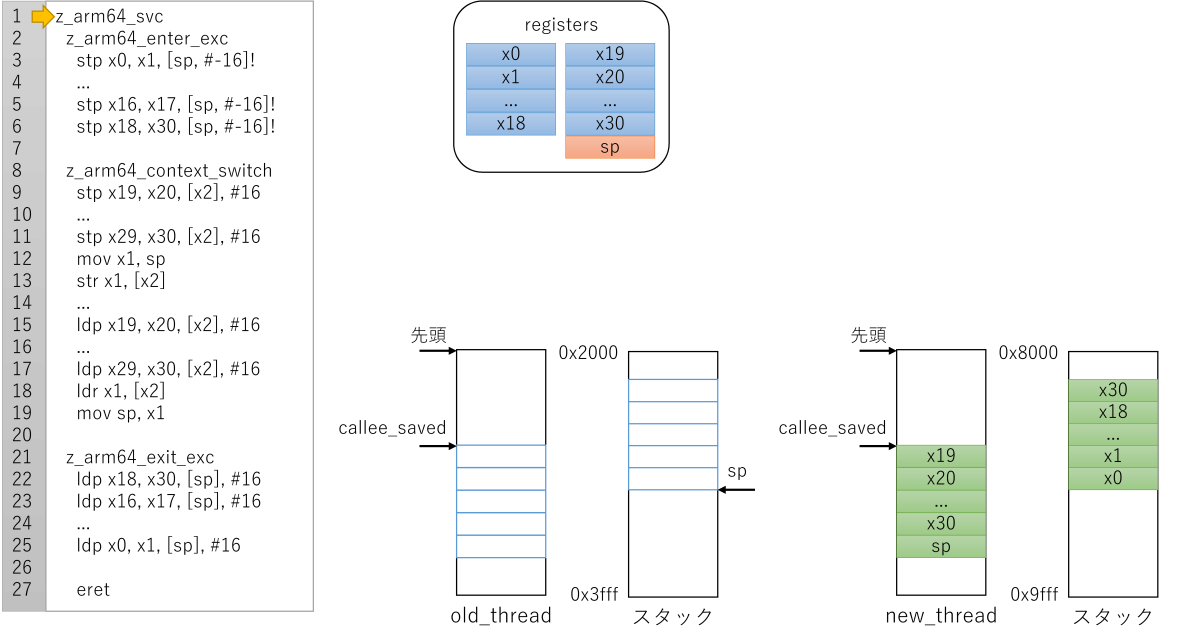
Zephyr AArch64のコンテキストスイッチ: 例外ハンドラ先頭
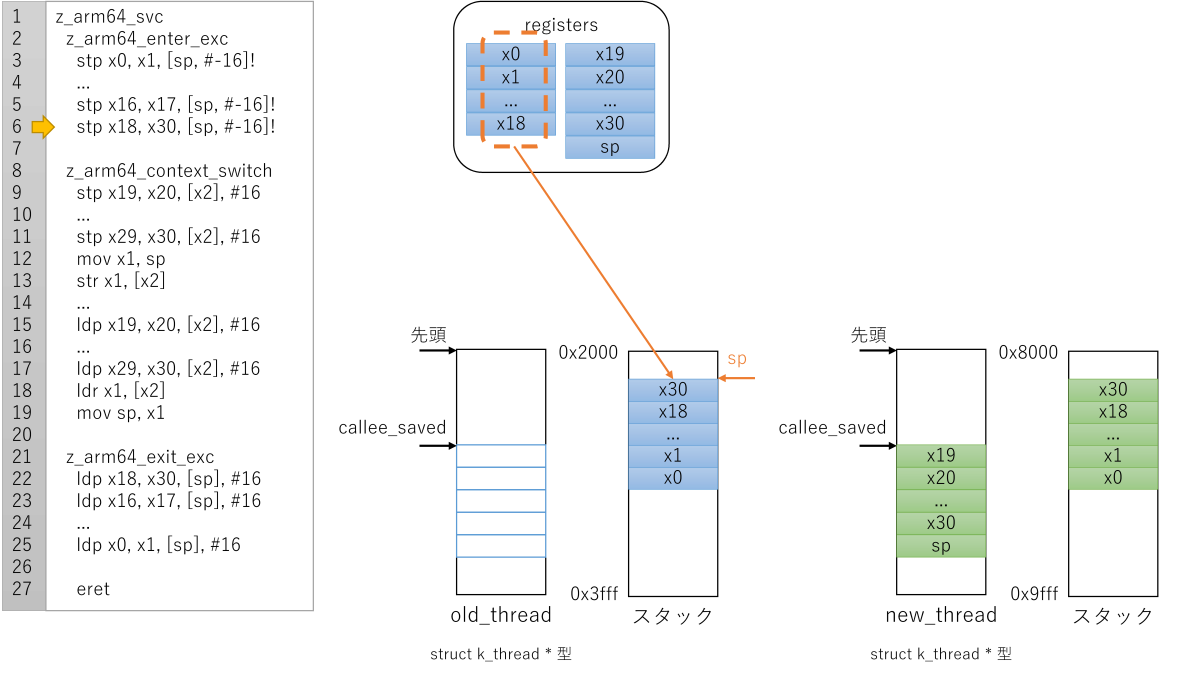
Zephyr AArch64のコンテキストスイッチ: 例外ハンドラ入り口、スタックへレジスタ退避
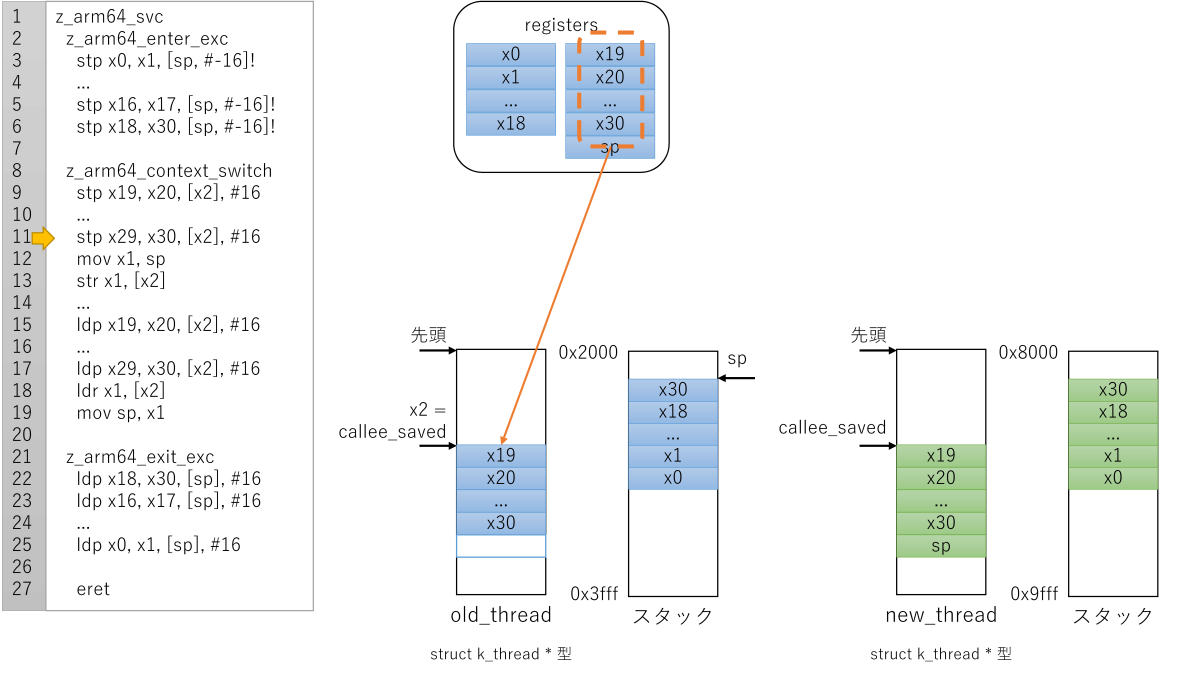
Zephyr AArch64のコンテキストスイッチ: コンテキストスイッチ前半、切り替え前スレッド構造体へレジスタ退避
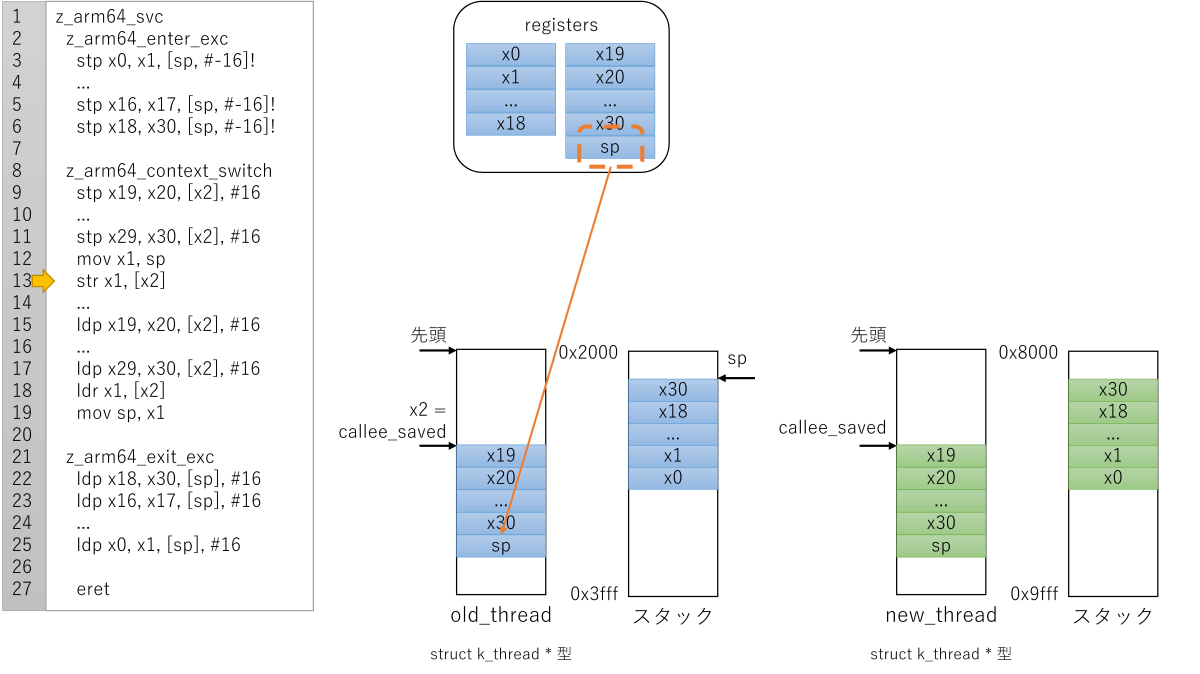
Zephyr AArch64のコンテキストスイッチ: コンテキストスイッチ前半、切り替え前スレッド構造体へスタックポインタ退避
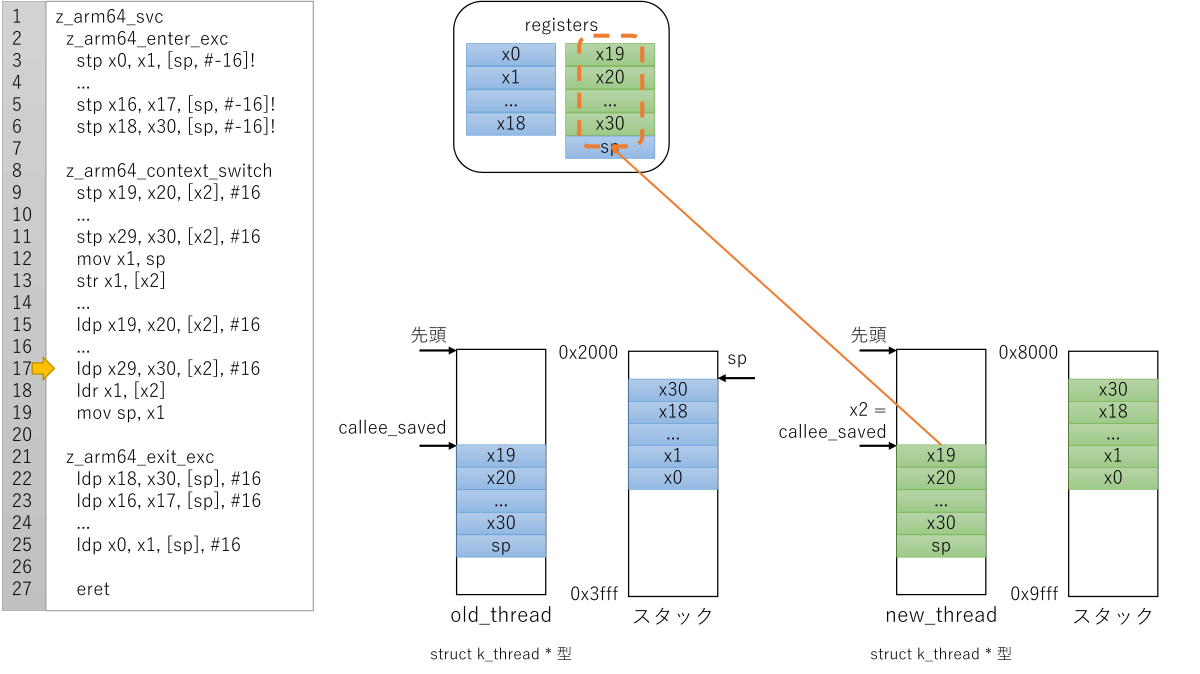
Zephyr AArch64のコンテキストスイッチ: コンテキストスイッチ後半、切り替え後スレッド構造体からレジスタ復旧
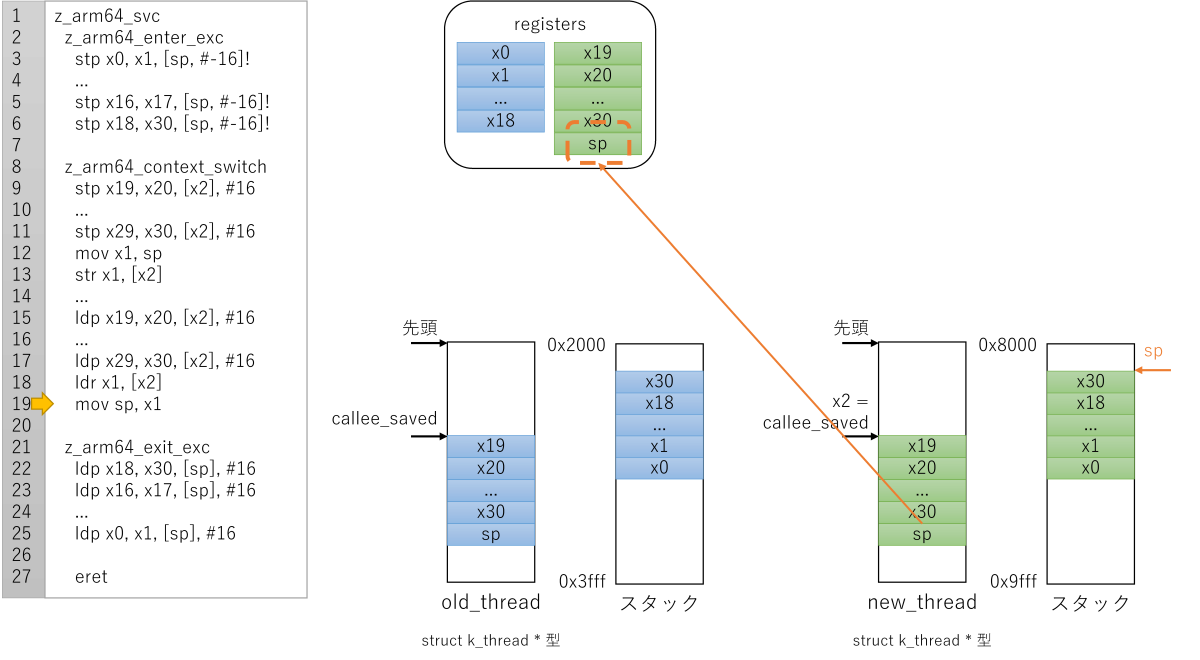
Zephyr AArch64のコンテキストスイッチ: コンテキストスイッチ後半、切り替え後スレッド構造体からスタックポインタ復旧(=スタック切り替え)
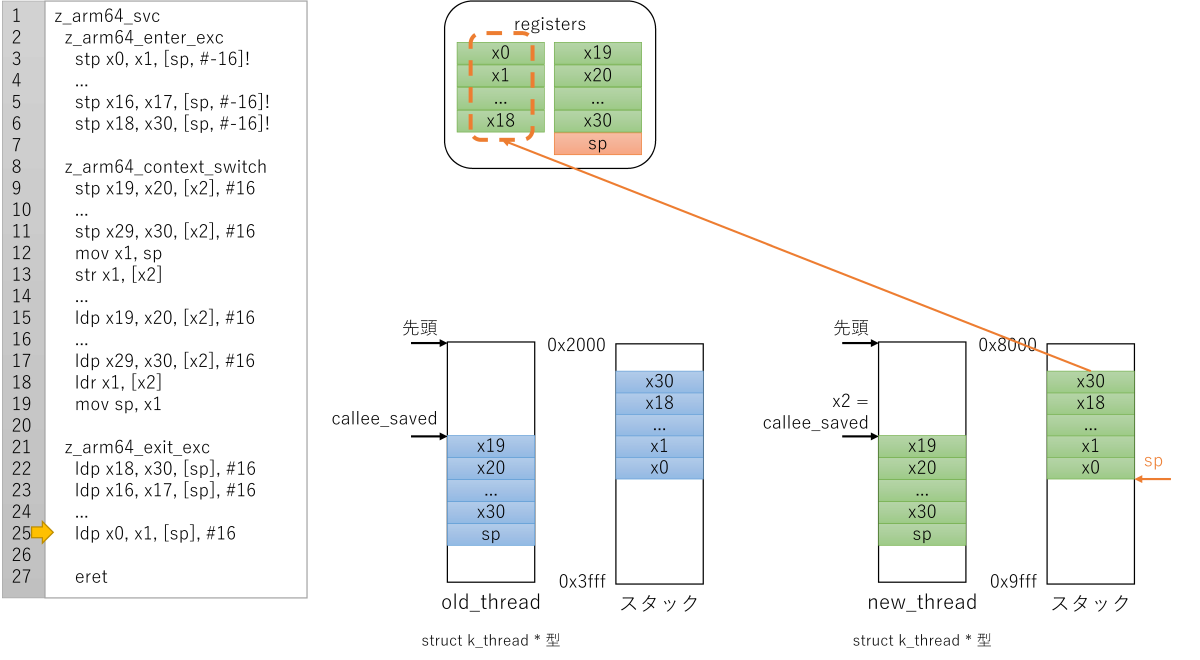
Zephyr AArch64のコンテキストスイッチ: 例外ハンドラ入り口、切り替え後のスタックからレジスタ復旧
図には書きませんでしたが、例外からリターンする命令(eret命令)が参照するレジスタ(SPSR, ELRレジスタ)もスタックに退避、復旧しています。従ってeretが戻る先は切り替え後のスレッドのコードです。
コメント一覧
- コメントはありません。
 この記事にコメントする
この記事にコメントする
2020年9月30日
Zephyr OSで遊ぼう その14 - SMP対応の準備、コンテキストスイッチの実装、中編1、既存実装調査
目次: Zephyr
前回は、新しい形式のコンテキストスイッチ関数arch_switch() のラッパー関数まで実装しました。RISC-V向け実装をする前に、既に新しいコンテキストスイッチ関数に対応しているAArch64の実装を調べます。
共通部分からアーキ依存部分
コンテキストスイッチ処理の共通部分(do_swap())から、アーキテクチャ依存部分(AArch64のarch_switch())に至るまでを見ます。
Zephyrの新しい形式のコンテキストスイッチ関数(共通部分)
// zephyr/kernel/include/kswap.h
/* New style context switching. arch_switch() is a lower level
* primitive that doesn't know about the scheduler or return value.
* Needed for SMP, where the scheduler requires spinlocking that we
* don't want to have to do in per-architecture assembly.
*
* Note that is_spinlock is a compile-time construct which will be
* optimized out when this function is expanded.
*/
static ALWAYS_INLINE unsigned int do_swap(unsigned int key,
struct k_spinlock *lock,
int is_spinlock)
{
...
if (new_thread != old_thread) {
#ifdef CONFIG_TIMESLICING
z_reset_time_slice();
#endif
old_thread->swap_retval = -EAGAIN;
#ifdef CONFIG_SMP
_current_cpu->swap_ok = 0;
new_thread->base.cpu = arch_curr_cpu()->id;
if (!is_spinlock) {
z_smp_release_global_lock(new_thread);
}
#endif
sys_trace_thread_switched_out();
_current_cpu->current = new_thread;
wait_for_switch(new_thread);
arch_switch(new_thread->switch_handle,
&old_thread->switch_handle); //★コンテキストスイッチ★
}
...
前々回に紹介した新しいコンテキストスイッチの方式(arch_switch())を使っていることがわかります。
AArch64の新しい形式のコンテキストスイッチarch_switch() 実装、入り口
// zephyr/arch/arm/include/aarch64/arch_func.h
static inline void arch_switch(void *switch_to, void **switched_from)
{
z_arm64_call_svc(switch_to, switched_from); //★アセンブラ実装へ★
return;
}
// zephyr/arch/arm/core/aarch64/switch.S
GTEXT(z_arm64_call_svc)
SECTION_FUNC(TEXT, z_arm64_call_svc)
svc #_SVC_CALL_CONTEXT_SWITCH //★スーパーバイザーコール命令★
ret
アセンブラ側の実装では、いきなりスーパーバイザーコール命令(svc命令)をぶっ放して、スーパーバイザーコール例外を起こすだけになっています。AArch64は例外ハンドラ内でコンテキストスイッチを行う仕組みのようです。
arch_switch() の引数
関数arch_switch() はスレッドを2つ受け取ります。old_threadは切り替え元のスレッド、new_threadは切り替え先のスレッドです。old_thread -> new_threadにコンテキストスイッチするわけです。ただし直接スレッド構造体を受け取るわけではなく、若干クセのある渡し方をします。
第1引数new_thread->switch_handle(void * 型)は切り替え先のスレッド構造体へのポインタ(struct k_thread * 型)new_threadが入っています。このポインタをキャストするとnew_threadが求められます。
実はここには罠があり、何も実装せずにいるとnew_thread->switch_handleにはNULLが入ります。すると、あとでCONFIG_SMPを有効にした段階でwait_for_switch() 関数にてハングアップします。こんなのパッと見ではわかりません……。
switch_handleの初期化
// zephyr/kernel/include/kswap.h
/* New style context switching. arch_switch() is a lower level
* primitive that doesn't know about the scheduler or return value.
* Needed for SMP, where the scheduler requires spinlocking that we
* don't want to have to do in per-architecture assembly.
*
* Note that is_spinlock is a compile-time construct which will be
* optimized out when this function is expanded.
*/
static ALWAYS_INLINE unsigned int do_swap(unsigned int key,
struct k_spinlock *lock,
int is_spinlock)
{
...
if (new_thread != old_thread) {
...
sys_trace_thread_switched_out();
_current_cpu->current = new_thread;
wait_for_switch(new_thread); //★これ★
arch_switch(new_thread->switch_handle,
&old_thread->switch_handle);
}
if (is_spinlock) {
arch_irq_unlock(key);
} else {
irq_unlock(key);
}
return _current->swap_retval;
}
/* There is an unavoidable SMP race when threads swap -- their thread
* record is in the queue (and visible to other CPUs) before
* arch_switch() finishes saving state. We must spin for the switch
* handle before entering a new thread. See docs on arch_switch().
*
* Note: future SMP architectures may need a fence/barrier or cache
* invalidation here. Current ones don't, and sadly Zephyr doesn't
* have a framework for that yet.
*/
static inline void wait_for_switch(struct k_thread *thread)
{
#ifdef CONFIG_SMP
volatile void **shp = (void *)&thread->switch_handle;
while (*shp == NULL) { //★CONFIG_SMP有効でnew_thread->switch_handleがNULLだとこのループでハング★
k_busy_wait(1);
}
#endif
}
AArch64向けのスレッド作成する関数を良く見ると、しれっとswitch_handleを初期化しています。この処理はRISC-V向けには存在しないため、追加する必要がありそうです。
switch_handleの初期化
// zephyr/arch/arm/core/aarch64/thread.c
/*
* An initial context, to be "restored" by z_arm64_context_switch(), is put at
* the other end of the stack, and thus reusable by the stack when not needed
* anymore.
*/
void arch_new_thread(struct k_thread *thread, k_thread_stack_t *stack,
char *stack_ptr, k_thread_entry_t entry,
void *p1, void *p2, void *p3)
{
...
/*
* We are saving:
*
* - SP: to pop out entry and parameters when going through
* z_thread_entry_wrapper().
* - x30: to be used by ret in z_arm64_context_switch() when the new
* task is first scheduled.
*/
thread->callee_saved.sp = (uint64_t)pInitCtx;
thread->callee_saved.x30 = (uint64_t)z_thread_entry_wrapper;
thread->switch_handle = thread; //★ここで初期化している★
}
関数arch_switch() の第2引数 &old_thread->switch_handle(void ** 型)は切り替え元のスレッド構造体のswitch_handleのポインタです。switch_handleの値(たいていNULL)自体には意味がなくて、このポインタからold_threadが計算できることが大事です。
長くなってきたので続きは次回。
コメント一覧
- コメントはありません。
 この記事にコメントする
この記事にコメントする
2020年9月29日
Zephyr OSで遊ぼう その13 - SMP対応の準備、コンテキストスイッチの実装、前編、ラッパー関数まで実装
目次: Zephyr
CONFIG_USE_SWITCHを有効にするとビルドエラーが発生しますので、都度対処します。
arch_thread_return_value_set()
最初はarch_thread_return_value_set() が二重定義だと怒られます。
arch_thread_return_value_set() が二重定義
../kernel/include/kernel_internal.h: At top level: ../kernel/include/kernel_internal.h:84:1: error: redefinition of 'arch_thread_return_value_set' arch_thread_return_value_set(struct k_thread *thread, unsigned int value) ^~~~~~~~~~~~~~~~~~~~~~~~~~~~
USE_SWITCHを有効にした場合、arch_thread_return_value_set() はカーネル側で定義されるので、アーキテクチャ側では実装不要です。
arch_thread_return_value_set() カーネル側の定義
// zephyr/arch/riscv/include/kernel_arch_func.h
static ALWAYS_INLINE void
arch_thread_return_value_set(struct k_thread *thread, unsigned int value)
{
thread->arch.swap_return_value = value;
}
// zephyr/include/arch/riscv/thread.h
struct _thread_arch {
uint32_t swap_return_value; /* Return value of z_swap() */
};
// zephyr/arch/riscv/core/offsets/offsets.c
GEN_OFFSET_SYM(_thread_arch_t, swap_return_value);
この辺りは要らないので #ifndef CONFIG_USE_SWITCHで囲って無効化します。
arch_switch
次はarch_switch() が未定義だと言われます。
arch_switch() が未定義
../kernel/include/kernel_arch_interface.h:126:20: warning: 'arch_switch' declared 'static' but never defined [-Wunused-function]
static inline void arch_switch(void *switch_to, void **switched_from);
^~~~~~~~~~~
この関数がUSE_SWITCHの本体です。他のアーキテクチャを見ると、arch_switch() はラッパー関数で、本体はアセンブラで書かれていることが多いようです。他の流儀に習っておきます。
arch_switch() ラッパー
// arch/riscv/include/kernel_arch_func.h
#ifdef CONFIG_USE_SWITCH
extern void z_riscv_switch(void *switch_to, void **switched_from);
static inline void arch_switch(void *switch_to, void **switched_from)
{
z_riscv_switch(switch_to, switched_from);
}
#else
...
肝心の中身はまた今度実装します。
コメント一覧
- コメントはありません。
 この記事にコメントする
この記事にコメントする
2020年9月28日
Zephyr OSで遊ぼう その12 - SMP対応の準備、コンテキストスイッチのコンフィグ
目次: Zephyr
以前(2020年2月21日の日記参照)ご紹介したとおり、ZephyrのRISC-V向け実装はSMPに対応していません。Zephyrのマルチコア対応を有効にするコンフィグはCONFIG_SMPですが、有効にすると大量のエラーが出て、何から直したら良いのかわからなくなります。
コンフィグや実装を見た限りでは、下記の4つのステップで対応していくと良さそうです。
- (今ここ)SMPの前提条件、新しいコンテキストスイッチ方式に対応する(CONFIG_USE_SWITCH, CONFIG_USE_SWITCH_SUPPORTED)
- SMPに対応する(CONFIG_SMP)、ただしCPUコア数は1
- 先頭ではないコア(mhartid != 0)で動作させる、ただしCPUコア数は1
- CPUコア数を1以上にする(CONFIG_SMP)
このコンフィグを有効にすその前に対応すべきコンフィグがあります。CONFIG_USE_SWITCHとCONFIG_USE_SWITCH_SUPPORTEDです。
CONFIG_USE_SWITCH
// zephyr/kernel/Kconfig
config USE_SWITCH
bool "Use new-style _arch_switch instead of arch_swap"
depends on USE_SWITCH_SUPPORTED
...
config SMP
bool "Enable symmetric multithreading support"
depends on USE_SWITCH
既存の各アーキテクチャの対応状況を見ると、
CONFIG_USE_SWITCH対応状況(一例)
// ARM
// Aarch32はUSE_SWITCHは未サポート
// AArch64はCortex-AのみUSE_SWITCHをサポート
// zephyr/arch/arm/core/aarch64/Kconfig
config CPU_CORTEX_A
bool
select CPU_CORTEX
select HAS_FLASH_LOAD_OFFSET
select USE_SWITCH
select USE_SWITCH_SUPPORTED
// ARC
// ARCV2はUSE_SWITCHをサポート
// zephyr/arch/arc/Kconfig
config CPU_ARCV2
bool
select ARCH_HAS_STACK_PROTECTION if ARC_HAS_STACK_CHECKING || ARC_MPU
select ARCH_HAS_USERSPACE if ARC_MPU
select USE_SWITCH
select USE_SWITCH_SUPPORTED
default y
他は載せませんがAArch64, ARC, x86_64, xtensaが対応しているようです。
Zephyrのコンテキストスイッチ
Zephyrにはコンテキストスイッチが2種類存在しています。違いは下記の通りです。
- arch_swap: シングルコア専用のコンテキストスイッチ、RISC-Vは対応済み
- arch_switch: SMPに対応したコンテキストスイッチ、シングルコアだと若干効率が悪い、RISC-Vは未対応
CONFIG_USE_SWITCH_SUPPORTEDを有効にするにはarch_switchを実装する必要がありますが、RISC-Vではシングルコアもマルチコアもあり得ますから、CONFIG_USE_SWITCHを無条件に有効にするのは得策ではないと考えられます。
SoC側のKconfigで有効にしても良いですし、ユーザーにmenuconfigから選んでもらう手もあります。あまり悩んでも仕方ないので、ユーザーが選べるようにして先に進めます。RISC-VのKconfigにSMP対応かどうか?を選べるコンフィグを一つ追加します。
CONFIG_USE_SWITCHを有効にするRISC-V向けコンフィグを追加
// zephyr/arch/riscv/Kconfig
config RISCV_SMP
bool "Does SOC has SMP"
select USE_SWITCH
select USE_SWITCH_SUPPORTED
有効にするとビルドエラーだらけになります。続きはまた今度。
コメント一覧
- コメントはありません。
 この記事にコメントする
この記事にコメントする
2020年9月22日
今Steamで3DMarkが安い
目次: ゲーム
Steamのセールで3DMarkが意味不明なほど安くなっていたので、買いました。Steamは突然90%OFFとか平然とやってくるので、定価とは……??という気分になります。
新しいマシンを買う(もしくはパーツを買う)時に役に立ちそうです。
コメント一覧
- コメントはありません。
 この記事にコメントする
この記事にコメントする
| < | 2020 | > | ||||
| << | < | 10 | > | >> | ||
| 日 | 月 | 火 | 水 | 木 | 金 | 土 |
| - | - | - | - | 1 | 2 | 3 |
| 4 | 5 | 6 | 7 | 8 | 9 | 10 |
| 11 | 12 | 13 | 14 | 15 | 16 | 17 |
| 18 | 19 | 20 | 21 | 22 | 23 | 24 |
| 25 | 26 | 27 | 28 | 29 | 30 | 31 |
こんてんつ
 wiki
wiki Linux JM
Linux JM Java API
Java API過去の日記
 2002年
2002年 2003年
2003年 2004年
2004年 2005年
2005年 2006年
2006年 2007年
2007年 2008年
2008年 2009年
2009年 2010年
2010年 2011年
2011年 2012年
2012年 2013年
2013年 2014年
2014年 2015年
2015年 2016年
2016年 2017年
2017年 2018年
2018年 2019年
2019年 2020年
2020年 2021年
2021年 2022年
2022年 2023年
2023年 2024年
2024年 2025年
2025年 2026年
2026年 過去日記について
過去日記についてその他の情報
 アクセス統計
アクセス統計 サーバ一覧
サーバ一覧 サイトの情報
サイトの情報合計:
本日:
 未来から過去へ表示(*)
未来から過去へ表示(*) 


